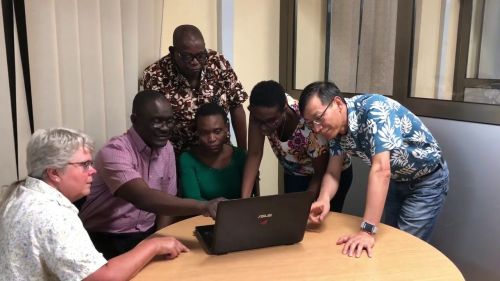Working Together to Tackle Food Insecurity in Tanzania and Ghana

Through selective breeding of African indigenous chickens to improve small scale poultry production, we can tackle food insecurity in Tanzania and Ghana.
The Feed the Future Innovation Lab for Genomics to Improve Poultry (GIP-IL) is a multidisciplinary team of scientists working diligently to develop a genetic platform for selective breeding of African indigenous chickens with improved resilience in the face of Newcastle Disease Virus (NDV). Virulent Newcastle Disease (vNDV) is a highly infectious and deadly viral disease affecting birds and poultry. In Africa, NDV is endemic and highly pathogenic strains can result in up to 100 percent mortality among affected flocks causing severe economic consequences for smallholder farmers. In 2018, an outbreak of vNDV was detected in backyard birds in California. Over a two-year period, the outbreak affected close to 500 premises, eventually spreading to commercial poultry before it was finally eradicated. The largest vNDV outbreaks in the U.S. have occurred in California with over $180 million in federal funds expended to eradicate an outbreak that occurred in 2002-2003. Introductions of vNDV through illegal importation of game birds poses an on-going threat to the U.S. poultry industry.
The GIP-IL has been able to charge ahead with research activities despite challenges associated with the COVID-19 pandemic. In response to the travel restrictions and limitations with regard to conducting in-person meetings, our program implemented a plan to address constraints and minimize risk for our team members. Our partners in Ghana and Tanzania quickly pivoted to virtual platforms allowing for dynamic online communication among our students and collaborating scientists around the world. We established weekly virtual meetings to conduct trainings and collaborate on research activities. For example, Dr. Esther Mollel, a veterinarian at the Sokoine University of Agriculture in Tanzania, co-mentored an undergraduate student on a project to assess egg characteristics of indigenous poultry ecotypes (Kuchi, Ching’weke and Morogoro medium). Dr. Mollel and the student worked virtually with our international team to design the study evaluating a range of traits including size, weight, yolk and albumen weight, color, and shell thickness, in addition to egg production. Our geneticists are holding online sessions to assist the student in analyses to evaluate for differences in egg characteristics between the ecotypes and the genetic contributions to egg quality. Selected egg traits, including production and quality, will be included in the targets for the genetic selection platform. Other targets will include genetic markers, genes, and signaling pathways, and other biomarkers associated with resistance to NDV and heat stress in indigenous chickens.
Our scientists are also working in the lab with local government partners on approaches to NDV detection and characterization as a means of building diagnostic laboratory capacity for NDV in Ghana and Tanzania and improving our understanding of the epidemiology of this virus across the continent. For this purpose, we developed an approach to characterize the viruses using a novel portable sequencing technology that provides virus sequence data in real-time. Using this protocol we were able to highlight the genetic diversity of vNDV strains circulating in Ghana and Tanzania and the importance of surveillance to better target disease control measures. As part of this effort, the team is conducting online laboratory trainings to ensure best practices in the molecular assays as well as biosafety. Ultimately, the goal is to transfer the technology and establish a network for information exchange on avian infectious diseases among experts in Ghana and Tanzania.
Furthermore, our partners at the International Livestock Research Institute (ILRI) have been able to work with our partners across Africa on analysis of data stemming from poultry value chain assessments conducted prior to the COVID-19 outbreak in Ghana and Tanzania. The assessments gathered key information on preferred chicken traits, constraints limiting the effectiveness of the poultry value chain, opportunities for chicken lines with increased resilience to NDV, men and women’s participation in the poultry value chain, and gender-based challenges in accessing poultry inputs and markets. Next steps are to assess demand for improved chicken lines selected for increased NDV resilience, identify sustainable approaches for breeding and distribution, and determine ways to effectively involve women farmers as actors in the value chain and enhance their access to indigenous chickens with enhanced ND resistance.
The GIP-IL is led by the University of California, Davis, in partnership with Iowa State University, Sokoine University of Agriculture, University of Ghana, and International Livestock Research Institute. This article was made possible by the generous support of the American people through the United States Agency for International Development (USAID). The contents are the responsibility of the University of California and do not necessarily reflect the views of USAID or the United States governments .